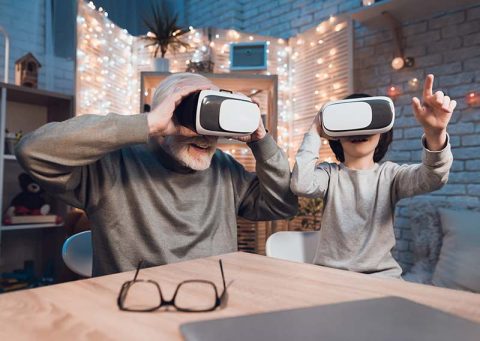December 17, 2021 by

Picture for a second how it could feel to grapple with the cognitive obstacles of dementia. The family and friends who are closest to you are now unfamiliar. The words and phrases that would roll off your tongue without a second thought are now just out of reach. In fact, the whole world as you once knew it has completely turned upside down, leaving you yearning for a familiar foothold.
However, one of the kindnesses imparted by Alzheimer’s is the long-term memories that often remain intact long after short-term memories have deteriorated. That is why helping aging adults with dementia get in touch with the past is often a very effective way to engage them – through movies, music, photos, and reminiscing. We can now add a new technology for dementia care to the list of ways we can help seniors mentally connect with the past that is demonstrating impressive results in seniors with Alzheimer’s disease: virtual reality.
Skip Rizzo, director for medical virtual reality at the USC Institute for Creative Technologies, has been using the technology to help veterans dealing with PTSD. He’s now broadening his reach to seniors – starting with his own 89-year-old mother, whose wonderful reaction to a virtual trip to Rome showed precisely how powerful the technology for dementia care can be for older adults.
Rizzo shares an experience in which he visited a care home where a small group of residents were simply sitting around a table in silence, until he began showing them flashcard-like pictures of objects from the past. The mood in the room changed immediately, and the seniors started to reminisce and share nostalgic memories with each other. With the capacity of low-tech tools such as simple photos to produce joy for older adults, just imagine the possibilities available to us now with high-tech options like virtual reality!
The benefit of virtual reality for seniors goes beyond just bringing enjoyment and boosting memory, such as:
Increased Socialization
As we know, senior isolation has a large impact on a number of mental health and physical issues. A recent study by the National Academies of Sciences, Engineering and Medicine announced that as many as one in four older adults are feeling socially isolated. To tackle this concern, AARP Innovation Labs developed an app called Alcove, in which seniors and their family and friends can enjoy virtual reality experiences together.
Improved Health Care
As virtual reality often helps to distract seniors from pain, effectively easing that pain for them, the health care benefits of virtual reality are easy to see. It can also be used to improve balance and other motor skills and improve spatial reasoning. It may even help doctors detect health conditions by observing how older adults respond in different games and activities.
At Home Independent Living’s caregivers are available to provide dementia and Alzheimer’s care services that can include assistance with challenging behaviors, advice on helpful technologies, transportation to appointments, encouraging participation in stimulating activities, and much more.
Want to explore creative options to improve quality of life for an older adult in your life? Contact our aging care team at 315-579-HOME (4663) for additional information about our caregiving services and memory care in Fayetteville and the surrounding areas.
